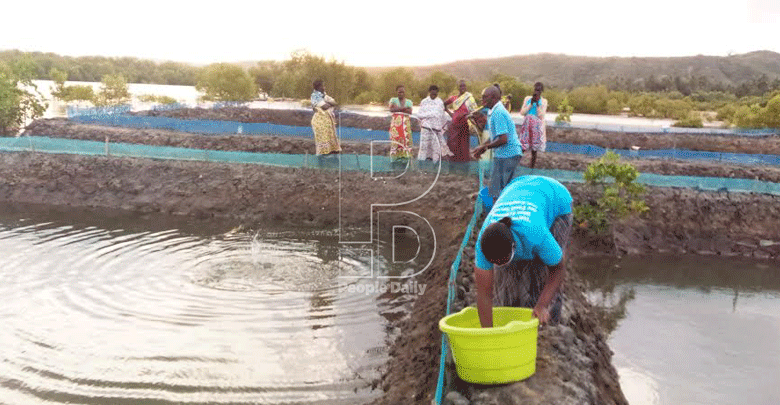Sea cucumber farming to improve livelihoods of coastal communities
By Jasmine Atieno, July 12, 2021
Jasmine Atieno and Jane Kiguta
When the Covid-19 pandemic broke-out in Kenya in March last year, it exposed the vulnerability of many households, consequently compounding threats to food security and nutrition, while exposing weaknesses in food systems.
This might have just been the cue needed to focus more on the seafood business, and apply climate smart fish farming innovations to boost the underexploited marine fisheries sector if the country is to be food secure.
Currently, Kenya Marine and Fisheries Research Institute (KMFRI) is running an integrated fish farming system, an experimental study aimed at boosting food production.
The Integrated Multi-Trophic Aquaculture (IMTA) research project led by Esther Wairimu, a research scientist and the project’s principal investigator, is doing a third sampling of sea cucumber integrated with different organisms in a bid to monitor the growth performance of the cultured organisms, water quality, nutrients, plankton and zooplankton abundance in the systems under trials.
It is also looking at the effects of growing sea cucumbers together with shrimps and cockles, as they have previously focused on growing caged shrimps only.
The study, funded by Kenya Climate-Smart Agriculture Project (KCSAP), is being carried out in partnership with Umoja Self-help Community Group in Kibokoni, Kilifi county.
“Some of the aquatic organisms being farmed under the system, include marine shrimps, marine water tilapia, filter feeders, such as cockles, oysters, and deposit feeders, such as sea cucumbers, which have been integrated in different culture units,” says Wairimu.
The study, the first of its kind in Kenya, has paved the way for the introduction of farmed sea cucumbers for the export market.
“Sea cucumbers are marine invertebrates that resemble their namesake vegetable, cucumbers, normally cultured in artificial ponds or shallow waters” she says.
Besides being a rich source of protein, minerals and vitamins, sea cucumbers contain several substances that may benefit overall health.
Some unconfirmed reports indicate some sea cucumber extracts are effective in fighting cancer cells and inhibit growth of some bad bacteria, and that they may even stop the spread and growth of human liver cancer cells.

The fishery has been in existence since the early 1900s in Kenya and are collected either as by-catch by spear fishermen and other gleaners or by fishers that target only sea cucumbers using snorkel and mask equipment.
The gear and boats are usually provided by dealers who purchase the processed product, while collectors at the landing beaches carry out the processing and drying.
The local level dealers in turn sell their products to afew exporters based in the coastal capital of Mombasa who than export to Hong Kong.
Reports indicate sea cucumber in Hong Kong fetches around $115 to $640 (Sh12,390 to Sh68,970) per kilogramme dry weight, and can go up to $1,670 (Sh179,970) per kg dry weight for animals greater than 1.5 kilogrammes.
The integration of sea cucumber in the aquaculture project, therefore, hopes to enhance production and profitability in small-scale mariculture enterprises in Kenya.
Why farm sea cucumbers?
“The successful completion of the project will improve livelihoods and create jobs for coastal communities,” she says.
Overexploitation of the sea cucumber fishing has raised alarm, and is now a worldwide concern for fisheries managers owing to rising demand of the animals globally.
Due to their high value, serial local depletions have been reported with fishermen migrating to new fishing areas in search of this marine treasures.
In recent revisions, the white teatfish and the black teatfish varieties were added to the Convention on International Trade in Endangered Species (CITES) of Wild Fauna and Flora as critically endangered.
Farming of sandfishes, which are small marine fishes with fringed lips, which burrow in the sand ,therefore, remains the only option.
Under the KMFRI’s integrated fish project, Wairimu and her team are farming sandfish after trials showed it is the most suitable for farming.
The integrated fish project supports the Big Four Agenda on food nutrition and security.
The Institute is, therefore, working with other fisheries stakeholders to complement seafood businesses in the marine fishing industry,” said the scientist.